Business in Asia: China's Slowdown and Australia's Mining Sector
VerifiedAdded on 2022/11/01
|9
|1842
|304
Essay
AI Summary
This essay explores the significant repercussions of China's economic slowdown on Australia's mining sector and broader economy. The analysis begins with an overview of the strong economic ties between the two nations, emphasizing Australia's reliance on iron ore exports to China. The essay then delves into the macroeconomic impacts, including the effects on Australia's trade accounts, GDP, and foreign investment. It highlights the potential for trade deficits, reduced commodity prices, and devaluation of the local currency. The essay also examines the impact on the mining sector, which is highly susceptible to fluctuations in the Chinese economy. Furthermore, the essay considers the social impacts, such as increased unemployment and its associated consequences. The analysis concludes by underscoring the interconnectedness of the two economies and the potential challenges that Australia faces due to China's economic slowdown.

Running head: BUSINESS IN ASIA 1
Business in Asia
Name
Institution
Business in Asia
Name
Institution
Paraphrase This Document
Need a fresh take? Get an instant paraphrase of this document with our AI Paraphraser
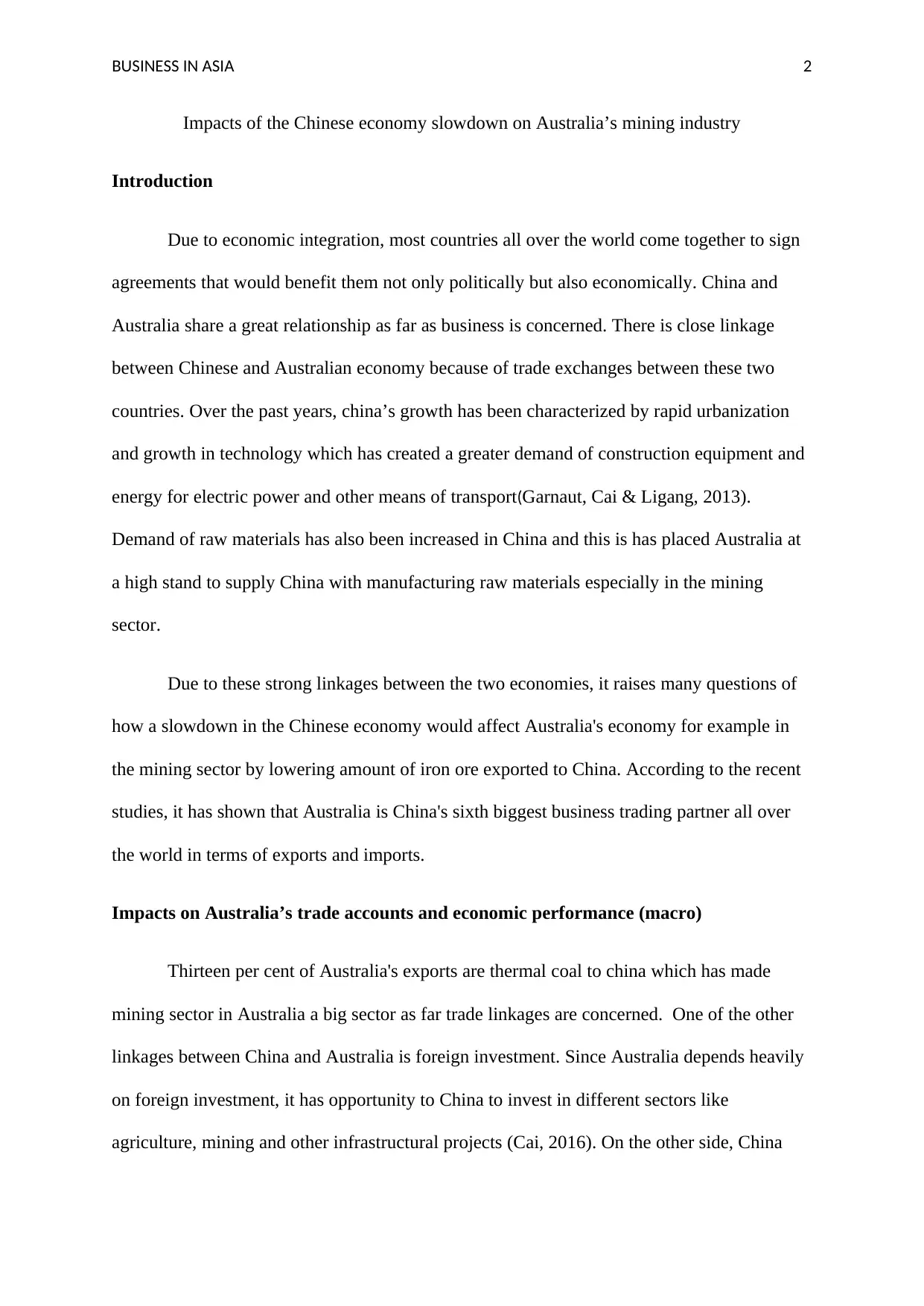
BUSINESS IN ASIA 2
Impacts of the Chinese economy slowdown on Australia’s mining industry
Introduction
Due to economic integration, most countries all over the world come together to sign
agreements that would benefit them not only politically but also economically. China and
Australia share a great relationship as far as business is concerned. There is close linkage
between Chinese and Australian economy because of trade exchanges between these two
countries. Over the past years, china’s growth has been characterized by rapid urbanization
and growth in technology which has created a greater demand of construction equipment and
energy for electric power and other means of transport(Garnaut, Cai & Ligang, 2013).
Demand of raw materials has also been increased in China and this is has placed Australia at
a high stand to supply China with manufacturing raw materials especially in the mining
sector.
Due to these strong linkages between the two economies, it raises many questions of
how a slowdown in the Chinese economy would affect Australia's economy for example in
the mining sector by lowering amount of iron ore exported to China. According to the recent
studies, it has shown that Australia is China's sixth biggest business trading partner all over
the world in terms of exports and imports.
Impacts on Australia’s trade accounts and economic performance (macro)
Thirteen per cent of Australia's exports are thermal coal to china which has made
mining sector in Australia a big sector as far trade linkages are concerned. One of the other
linkages between China and Australia is foreign investment. Since Australia depends heavily
on foreign investment, it has opportunity to China to invest in different sectors like
agriculture, mining and other infrastructural projects (Cai, 2016). On the other side, China
Impacts of the Chinese economy slowdown on Australia’s mining industry
Introduction
Due to economic integration, most countries all over the world come together to sign
agreements that would benefit them not only politically but also economically. China and
Australia share a great relationship as far as business is concerned. There is close linkage
between Chinese and Australian economy because of trade exchanges between these two
countries. Over the past years, china’s growth has been characterized by rapid urbanization
and growth in technology which has created a greater demand of construction equipment and
energy for electric power and other means of transport(Garnaut, Cai & Ligang, 2013).
Demand of raw materials has also been increased in China and this is has placed Australia at
a high stand to supply China with manufacturing raw materials especially in the mining
sector.
Due to these strong linkages between the two economies, it raises many questions of
how a slowdown in the Chinese economy would affect Australia's economy for example in
the mining sector by lowering amount of iron ore exported to China. According to the recent
studies, it has shown that Australia is China's sixth biggest business trading partner all over
the world in terms of exports and imports.
Impacts on Australia’s trade accounts and economic performance (macro)
Thirteen per cent of Australia's exports are thermal coal to china which has made
mining sector in Australia a big sector as far trade linkages are concerned. One of the other
linkages between China and Australia is foreign investment. Since Australia depends heavily
on foreign investment, it has opportunity to China to invest in different sectors like
agriculture, mining and other infrastructural projects (Cai, 2016). On the other side, China
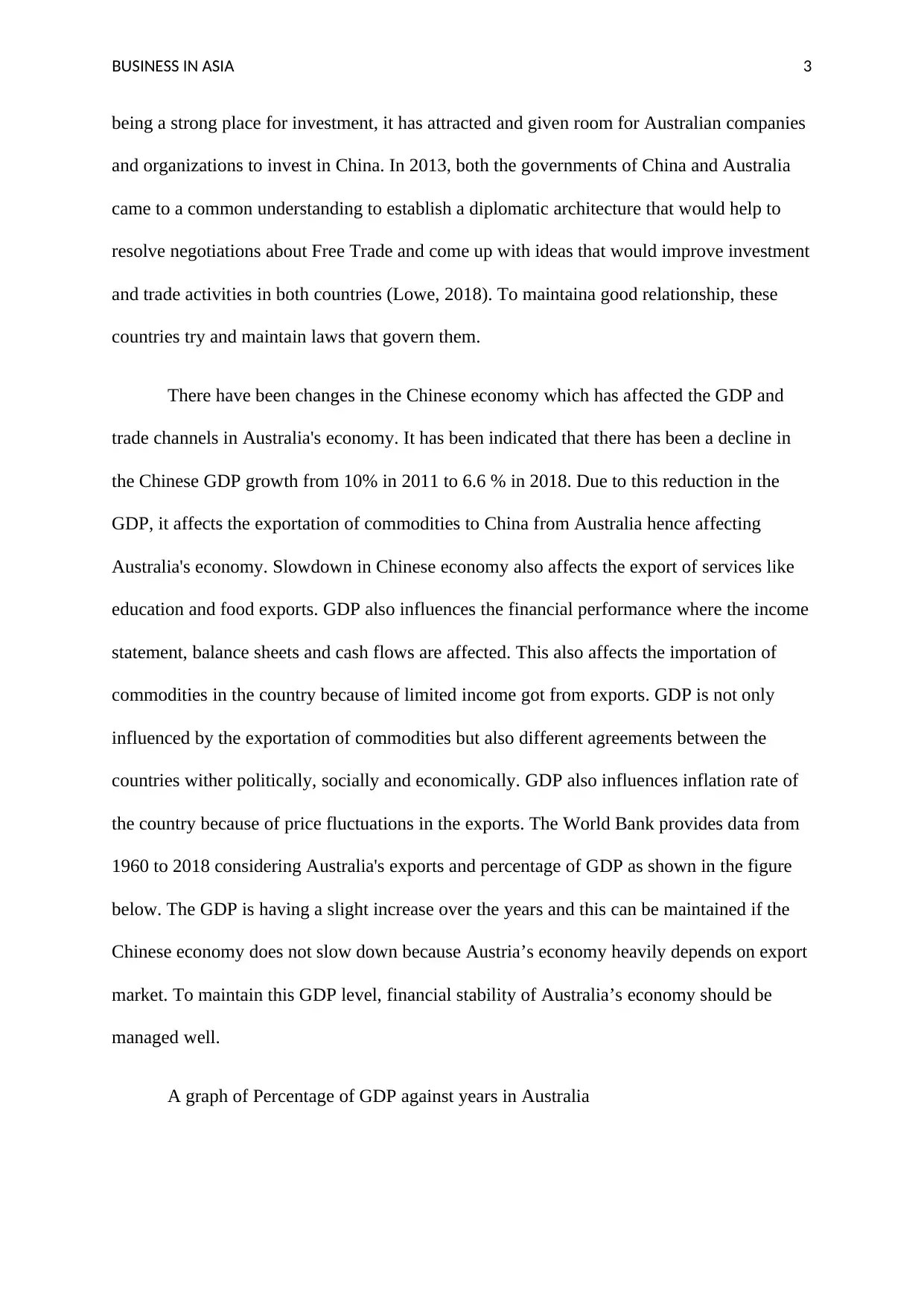
BUSINESS IN ASIA 3
being a strong place for investment, it has attracted and given room for Australian companies
and organizations to invest in China. In 2013, both the governments of China and Australia
came to a common understanding to establish a diplomatic architecture that would help to
resolve negotiations about Free Trade and come up with ideas that would improve investment
and trade activities in both countries (Lowe, 2018). To maintaina good relationship, these
countries try and maintain laws that govern them.
There have been changes in the Chinese economy which has affected the GDP and
trade channels in Australia's economy. It has been indicated that there has been a decline in
the Chinese GDP growth from 10% in 2011 to 6.6 % in 2018. Due to this reduction in the
GDP, it affects the exportation of commodities to China from Australia hence affecting
Australia's economy. Slowdown in Chinese economy also affects the export of services like
education and food exports. GDP also influences the financial performance where the income
statement, balance sheets and cash flows are affected. This also affects the importation of
commodities in the country because of limited income got from exports. GDP is not only
influenced by the exportation of commodities but also different agreements between the
countries wither politically, socially and economically. GDP also influences inflation rate of
the country because of price fluctuations in the exports. The World Bank provides data from
1960 to 2018 considering Australia's exports and percentage of GDP as shown in the figure
below. The GDP is having a slight increase over the years and this can be maintained if the
Chinese economy does not slow down because Austria’s economy heavily depends on export
market. To maintain this GDP level, financial stability of Australia’s economy should be
managed well.
A graph of Percentage of GDP against years in Australia
being a strong place for investment, it has attracted and given room for Australian companies
and organizations to invest in China. In 2013, both the governments of China and Australia
came to a common understanding to establish a diplomatic architecture that would help to
resolve negotiations about Free Trade and come up with ideas that would improve investment
and trade activities in both countries (Lowe, 2018). To maintaina good relationship, these
countries try and maintain laws that govern them.
There have been changes in the Chinese economy which has affected the GDP and
trade channels in Australia's economy. It has been indicated that there has been a decline in
the Chinese GDP growth from 10% in 2011 to 6.6 % in 2018. Due to this reduction in the
GDP, it affects the exportation of commodities to China from Australia hence affecting
Australia's economy. Slowdown in Chinese economy also affects the export of services like
education and food exports. GDP also influences the financial performance where the income
statement, balance sheets and cash flows are affected. This also affects the importation of
commodities in the country because of limited income got from exports. GDP is not only
influenced by the exportation of commodities but also different agreements between the
countries wither politically, socially and economically. GDP also influences inflation rate of
the country because of price fluctuations in the exports. The World Bank provides data from
1960 to 2018 considering Australia's exports and percentage of GDP as shown in the figure
below. The GDP is having a slight increase over the years and this can be maintained if the
Chinese economy does not slow down because Austria’s economy heavily depends on export
market. To maintain this GDP level, financial stability of Australia’s economy should be
managed well.
A graph of Percentage of GDP against years in Australia
⊘ This is a preview!⊘
Do you want full access?
Subscribe today to unlock all pages.

Trusted by 1+ million students worldwide
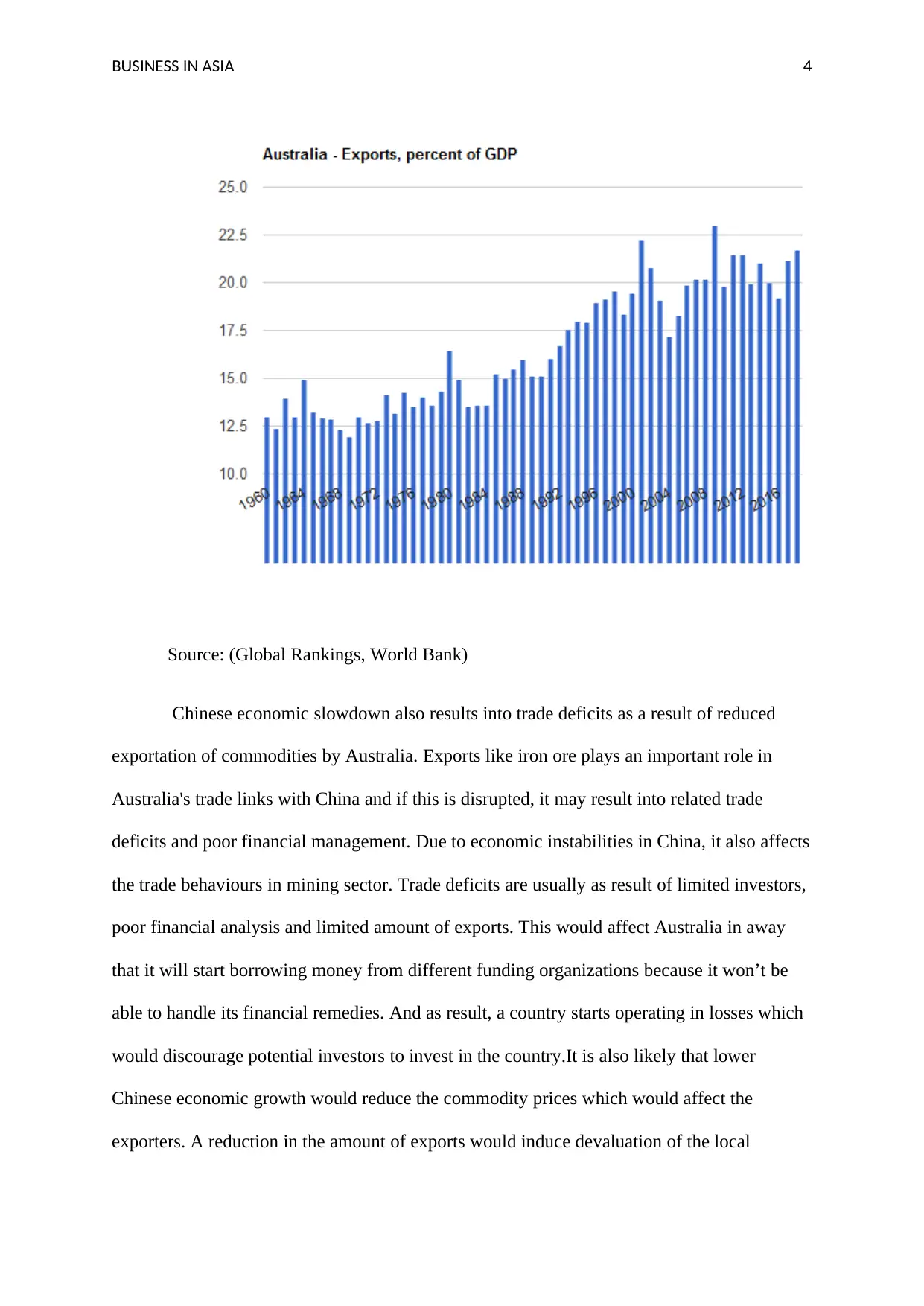
BUSINESS IN ASIA 4
Source: (Global Rankings, World Bank)
Chinese economic slowdown also results into trade deficits as a result of reduced
exportation of commodities by Australia. Exports like iron ore plays an important role in
Australia's trade links with China and if this is disrupted, it may result into related trade
deficits and poor financial management. Due to economic instabilities in China, it also affects
the trade behaviours in mining sector. Trade deficits are usually as result of limited investors,
poor financial analysis and limited amount of exports. This would affect Australia in away
that it will start borrowing money from different funding organizations because it won’t be
able to handle its financial remedies. And as result, a country starts operating in losses which
would discourage potential investors to invest in the country.It is also likely that lower
Chinese economic growth would reduce the commodity prices which would affect the
exporters. A reduction in the amount of exports would induce devaluation of the local
Source: (Global Rankings, World Bank)
Chinese economic slowdown also results into trade deficits as a result of reduced
exportation of commodities by Australia. Exports like iron ore plays an important role in
Australia's trade links with China and if this is disrupted, it may result into related trade
deficits and poor financial management. Due to economic instabilities in China, it also affects
the trade behaviours in mining sector. Trade deficits are usually as result of limited investors,
poor financial analysis and limited amount of exports. This would affect Australia in away
that it will start borrowing money from different funding organizations because it won’t be
able to handle its financial remedies. And as result, a country starts operating in losses which
would discourage potential investors to invest in the country.It is also likely that lower
Chinese economic growth would reduce the commodity prices which would affect the
exporters. A reduction in the amount of exports would induce devaluation of the local
Paraphrase This Document
Need a fresh take? Get an instant paraphrase of this document with our AI Paraphraser
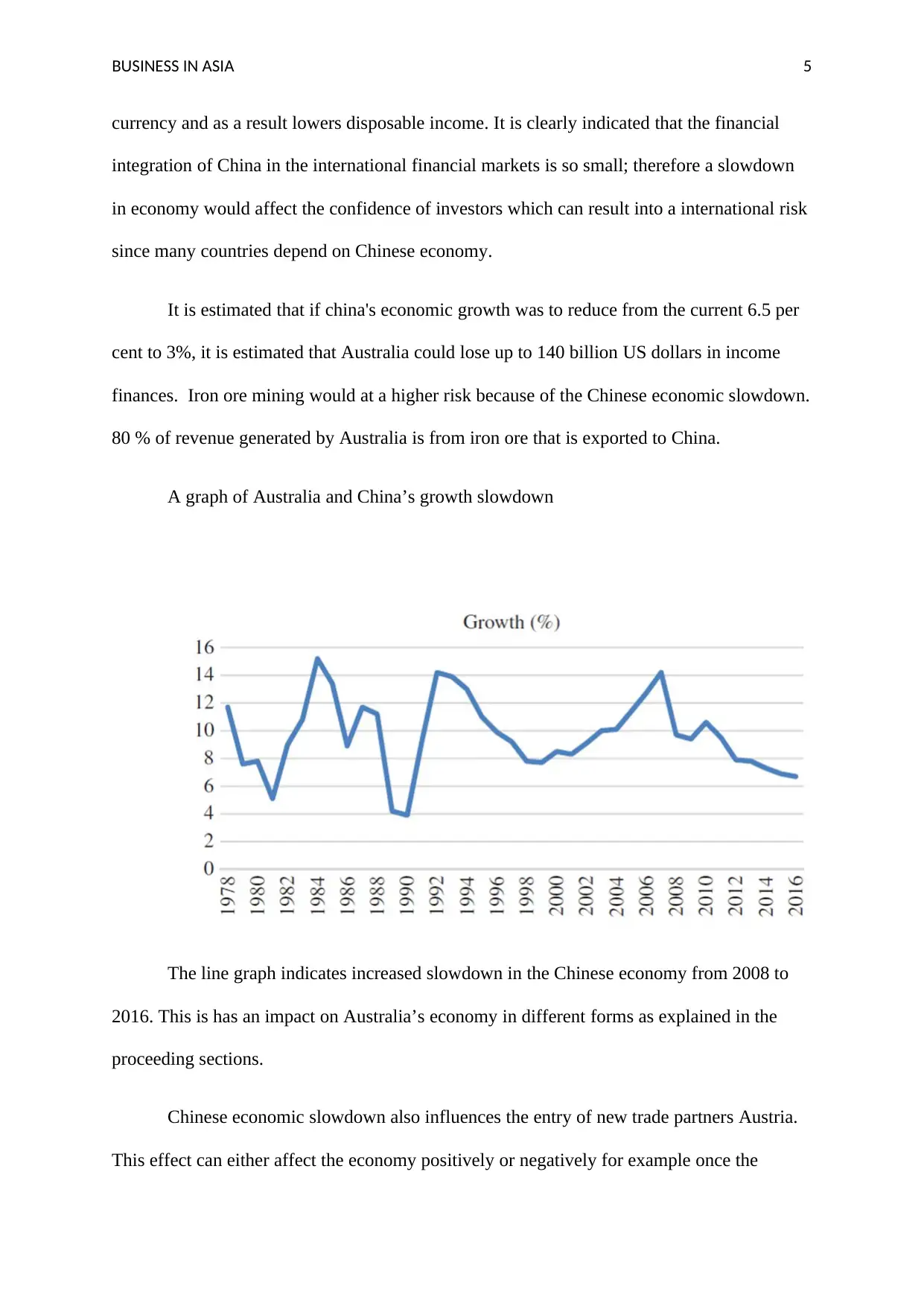
BUSINESS IN ASIA 5
currency and as a result lowers disposable income. It is clearly indicated that the financial
integration of China in the international financial markets is so small; therefore a slowdown
in economy would affect the confidence of investors which can result into a international risk
since many countries depend on Chinese economy.
It is estimated that if china's economic growth was to reduce from the current 6.5 per
cent to 3%, it is estimated that Australia could lose up to 140 billion US dollars in income
finances. Iron ore mining would at a higher risk because of the Chinese economic slowdown.
80 % of revenue generated by Australia is from iron ore that is exported to China.
A graph of Australia and China’s growth slowdown
The line graph indicates increased slowdown in the Chinese economy from 2008 to
2016. This is has an impact on Australia’s economy in different forms as explained in the
proceeding sections.
Chinese economic slowdown also influences the entry of new trade partners Austria.
This effect can either affect the economy positively or negatively for example once the
currency and as a result lowers disposable income. It is clearly indicated that the financial
integration of China in the international financial markets is so small; therefore a slowdown
in economy would affect the confidence of investors which can result into a international risk
since many countries depend on Chinese economy.
It is estimated that if china's economic growth was to reduce from the current 6.5 per
cent to 3%, it is estimated that Australia could lose up to 140 billion US dollars in income
finances. Iron ore mining would at a higher risk because of the Chinese economic slowdown.
80 % of revenue generated by Australia is from iron ore that is exported to China.
A graph of Australia and China’s growth slowdown
The line graph indicates increased slowdown in the Chinese economy from 2008 to
2016. This is has an impact on Australia’s economy in different forms as explained in the
proceeding sections.
Chinese economic slowdown also influences the entry of new trade partners Austria.
This effect can either affect the economy positively or negatively for example once the
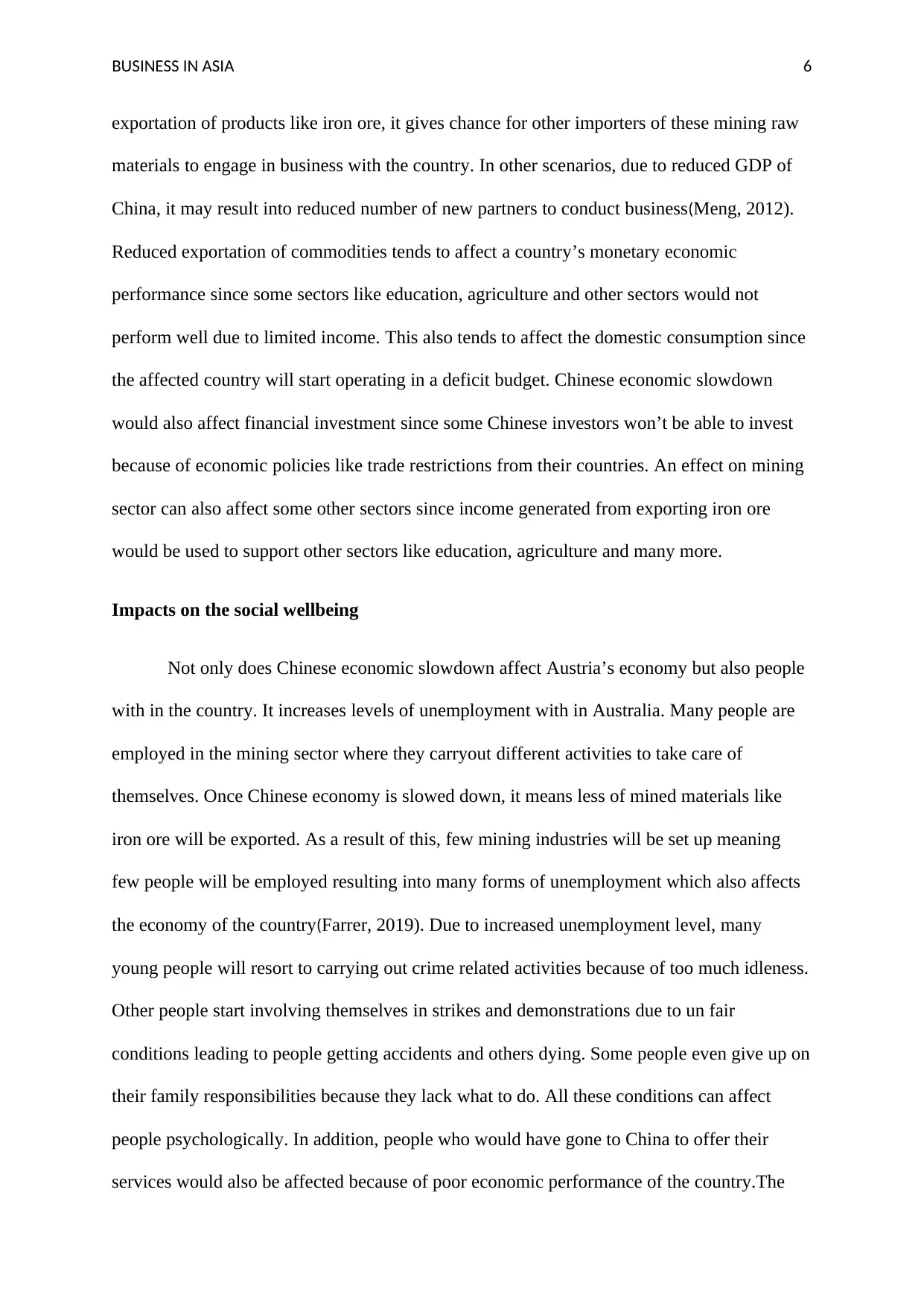
BUSINESS IN ASIA 6
exportation of products like iron ore, it gives chance for other importers of these mining raw
materials to engage in business with the country. In other scenarios, due to reduced GDP of
China, it may result into reduced number of new partners to conduct business(Meng, 2012).
Reduced exportation of commodities tends to affect a country’s monetary economic
performance since some sectors like education, agriculture and other sectors would not
perform well due to limited income. This also tends to affect the domestic consumption since
the affected country will start operating in a deficit budget. Chinese economic slowdown
would also affect financial investment since some Chinese investors won’t be able to invest
because of economic policies like trade restrictions from their countries. An effect on mining
sector can also affect some other sectors since income generated from exporting iron ore
would be used to support other sectors like education, agriculture and many more.
Impacts on the social wellbeing
Not only does Chinese economic slowdown affect Austria’s economy but also people
with in the country. It increases levels of unemployment with in Australia. Many people are
employed in the mining sector where they carryout different activities to take care of
themselves. Once Chinese economy is slowed down, it means less of mined materials like
iron ore will be exported. As a result of this, few mining industries will be set up meaning
few people will be employed resulting into many forms of unemployment which also affects
the economy of the country(Farrer, 2019). Due to increased unemployment level, many
young people will resort to carrying out crime related activities because of too much idleness.
Other people start involving themselves in strikes and demonstrations due to un fair
conditions leading to people getting accidents and others dying. Some people even give up on
their family responsibilities because they lack what to do. All these conditions can affect
people psychologically. In addition, people who would have gone to China to offer their
services would also be affected because of poor economic performance of the country.The
exportation of products like iron ore, it gives chance for other importers of these mining raw
materials to engage in business with the country. In other scenarios, due to reduced GDP of
China, it may result into reduced number of new partners to conduct business(Meng, 2012).
Reduced exportation of commodities tends to affect a country’s monetary economic
performance since some sectors like education, agriculture and other sectors would not
perform well due to limited income. This also tends to affect the domestic consumption since
the affected country will start operating in a deficit budget. Chinese economic slowdown
would also affect financial investment since some Chinese investors won’t be able to invest
because of economic policies like trade restrictions from their countries. An effect on mining
sector can also affect some other sectors since income generated from exporting iron ore
would be used to support other sectors like education, agriculture and many more.
Impacts on the social wellbeing
Not only does Chinese economic slowdown affect Austria’s economy but also people
with in the country. It increases levels of unemployment with in Australia. Many people are
employed in the mining sector where they carryout different activities to take care of
themselves. Once Chinese economy is slowed down, it means less of mined materials like
iron ore will be exported. As a result of this, few mining industries will be set up meaning
few people will be employed resulting into many forms of unemployment which also affects
the economy of the country(Farrer, 2019). Due to increased unemployment level, many
young people will resort to carrying out crime related activities because of too much idleness.
Other people start involving themselves in strikes and demonstrations due to un fair
conditions leading to people getting accidents and others dying. Some people even give up on
their family responsibilities because they lack what to do. All these conditions can affect
people psychologically. In addition, people who would have gone to China to offer their
services would also be affected because of poor economic performance of the country.The
⊘ This is a preview!⊘
Do you want full access?
Subscribe today to unlock all pages.

Trusted by 1+ million students worldwide
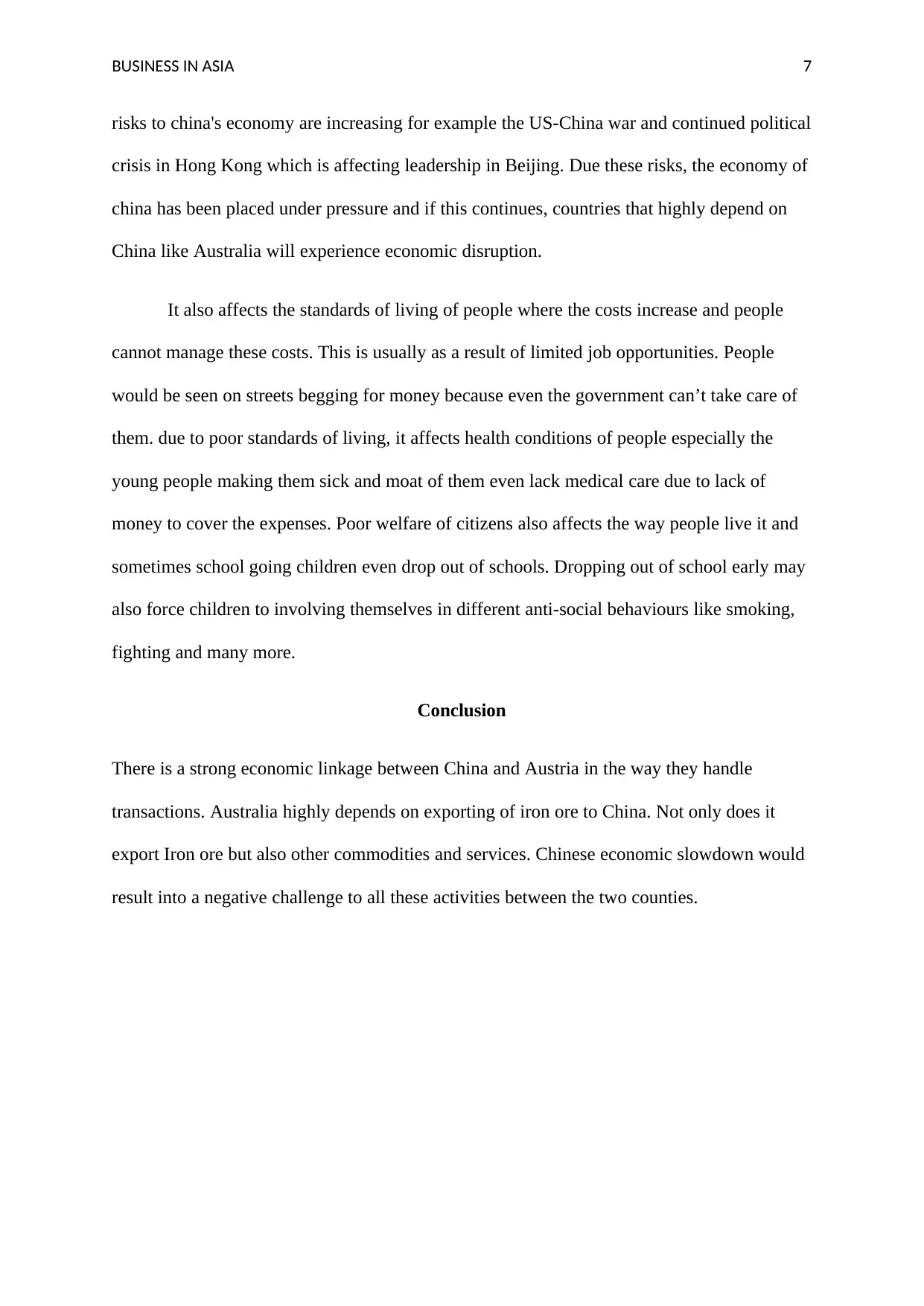
BUSINESS IN ASIA 7
risks to china's economy are increasing for example the US-China war and continued political
crisis in Hong Kong which is affecting leadership in Beijing. Due these risks, the economy of
china has been placed under pressure and if this continues, countries that highly depend on
China like Australia will experience economic disruption.
It also affects the standards of living of people where the costs increase and people
cannot manage these costs. This is usually as a result of limited job opportunities. People
would be seen on streets begging for money because even the government can’t take care of
them. due to poor standards of living, it affects health conditions of people especially the
young people making them sick and moat of them even lack medical care due to lack of
money to cover the expenses. Poor welfare of citizens also affects the way people live it and
sometimes school going children even drop out of schools. Dropping out of school early may
also force children to involving themselves in different anti-social behaviours like smoking,
fighting and many more.
Conclusion
There is a strong economic linkage between China and Austria in the way they handle
transactions. Australia highly depends on exporting of iron ore to China. Not only does it
export Iron ore but also other commodities and services. Chinese economic slowdown would
result into a negative challenge to all these activities between the two counties.
risks to china's economy are increasing for example the US-China war and continued political
crisis in Hong Kong which is affecting leadership in Beijing. Due these risks, the economy of
china has been placed under pressure and if this continues, countries that highly depend on
China like Australia will experience economic disruption.
It also affects the standards of living of people where the costs increase and people
cannot manage these costs. This is usually as a result of limited job opportunities. People
would be seen on streets begging for money because even the government can’t take care of
them. due to poor standards of living, it affects health conditions of people especially the
young people making them sick and moat of them even lack medical care due to lack of
money to cover the expenses. Poor welfare of citizens also affects the way people live it and
sometimes school going children even drop out of schools. Dropping out of school early may
also force children to involving themselves in different anti-social behaviours like smoking,
fighting and many more.
Conclusion
There is a strong economic linkage between China and Austria in the way they handle
transactions. Australia highly depends on exporting of iron ore to China. Not only does it
export Iron ore but also other commodities and services. Chinese economic slowdown would
result into a negative challenge to all these activities between the two counties.
Paraphrase This Document
Need a fresh take? Get an instant paraphrase of this document with our AI Paraphraser
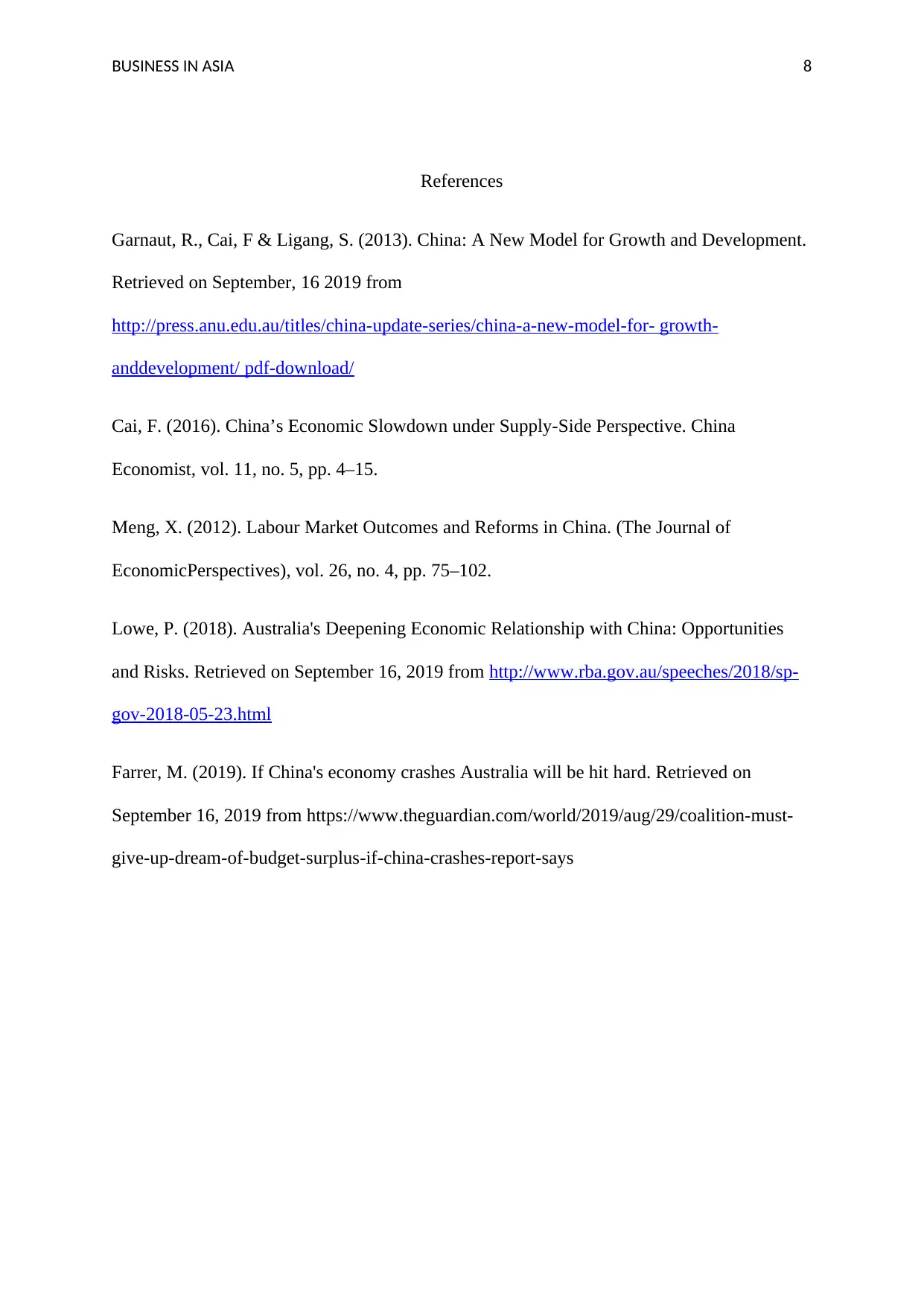
BUSINESS IN ASIA 8
References
Garnaut, R., Cai, F & Ligang, S. (2013). China: A New Model for Growth and Development.
Retrieved on September, 16 2019 from
http://press.anu.edu.au/titles/china-update-series/china-a-new-model-for- growth-
anddevelopment/ pdf-download/
Cai, F. (2016). China’s Economic Slowdown under Supply-Side Perspective. China
Economist, vol. 11, no. 5, pp. 4–15.
Meng, X. (2012). Labour Market Outcomes and Reforms in China. (The Journal of
EconomicPerspectives), vol. 26, no. 4, pp. 75–102.
Lowe, P. (2018). Australia's Deepening Economic Relationship with China: Opportunities
and Risks. Retrieved on September 16, 2019 from http://www.rba.gov.au/speeches/2018/sp-
gov-2018-05-23.html
Farrer, M. (2019). If China's economy crashes Australia will be hit hard. Retrieved on
September 16, 2019 from https://www.theguardian.com/world/2019/aug/29/coalition-must-
give-up-dream-of-budget-surplus-if-china-crashes-report-says
References
Garnaut, R., Cai, F & Ligang, S. (2013). China: A New Model for Growth and Development.
Retrieved on September, 16 2019 from
http://press.anu.edu.au/titles/china-update-series/china-a-new-model-for- growth-
anddevelopment/ pdf-download/
Cai, F. (2016). China’s Economic Slowdown under Supply-Side Perspective. China
Economist, vol. 11, no. 5, pp. 4–15.
Meng, X. (2012). Labour Market Outcomes and Reforms in China. (The Journal of
EconomicPerspectives), vol. 26, no. 4, pp. 75–102.
Lowe, P. (2018). Australia's Deepening Economic Relationship with China: Opportunities
and Risks. Retrieved on September 16, 2019 from http://www.rba.gov.au/speeches/2018/sp-
gov-2018-05-23.html
Farrer, M. (2019). If China's economy crashes Australia will be hit hard. Retrieved on
September 16, 2019 from https://www.theguardian.com/world/2019/aug/29/coalition-must-
give-up-dream-of-budget-surplus-if-china-crashes-report-says

BUSINESS IN ASIA 9
⊘ This is a preview!⊘
Do you want full access?
Subscribe today to unlock all pages.

Trusted by 1+ million students worldwide
1 out of 9
Related Documents
Your All-in-One AI-Powered Toolkit for Academic Success.
+13062052269
info@desklib.com
Available 24*7 on WhatsApp / Email
![[object Object]](/_next/static/media/star-bottom.7253800d.svg)
Unlock your academic potential
Copyright © 2020–2026 A2Z Services. All Rights Reserved. Developed and managed by ZUCOL.





